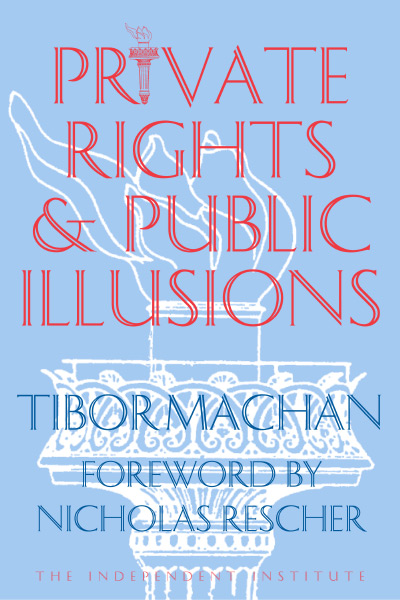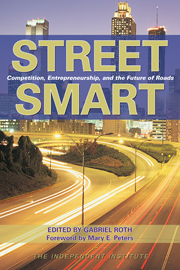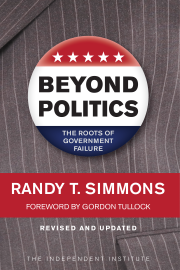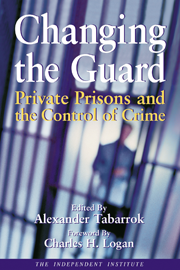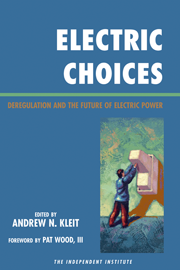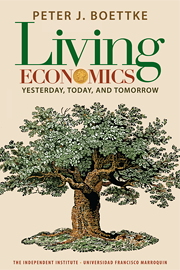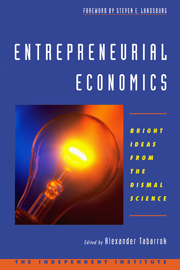| List Price: | ||
| Price: | $18.70 | |
| Discount: | $6.25 (Save 25%) |
| List Price: | ||
| Price: | $18.70 | |
| Discount: | $6.25 (Save 25%) |
Overview
What is the proper role for government in society? Traditionally, things considered “important” have been presumed to be a government concern. But what are the limits to this public sphere? Should government be limited to protecting individual rights, such as the right to private property, under a uniform “rule of law”? Or should government have a broad scope, including such tasks as regulation of advertising, firearms control, warning about the dangers of alcohol and tobacco, and providing universal health care?
Private Rights and Public Illusions argues that few problems concern or affect most members of society in any uniform way, and—contrary to conventional belief—both “private” and “public” realms are driven by the self-interests of those involved. This misunderstanding of the concept of “public” affairs forms the basis for governmental intrusiveness into the personal lives and business affairs of peaceful citizens.
Professor Machan shows how government bureaucracies have done far worse than merely fail to solve social problems; they have actually produced greater problems. In addition, they have undercut the private solutions of civil society and have created situations for ripe for misuse of this power over others.
By clearly defining a proper role for the “public” realm and distinguishing it from the “private” realm, this book urges greater reliance on the productivity, spontaneity, and civility uniquely present in private life.
Contents
- Chapter 1: U. S. Polity and the Welfare State
- Chapter 2: Rational Choice and Public Affairs
- Chapter 3: Human Dignity and the Welfare State
- Chapter 4: Should Business Be Regulated?
- Chapter 5: Further Normative Aspects of Deregulation
- Chapter 6: Ethics and the Regulation of Professional Ethics
- Chapter 7: Occupational Safety and Health
- Chapter 8: Pollution
- Chapter 9: Advertising
- Chapter 10: Labor Policy
- Chapter 11: Philosophies of Public Policy in Contact
Detailed Summary
- Government today is routinely involved in matters which were viewed as strictly private just a few decades ago. Treatment of dolphins at resort hotels, cigarette smoking on private property, daycare for children of working mothers, drug use, medical insurance, factory closings, inflation, hate speech, education at all levels, and countless other matters—all are seen as equally proper areas for government provision or regulation. While the expansion of government may be motivated by concerns for justice and human well-being, it instead institutionalizes the use of invasive force against the liberties and privacy of the innocent, the very people it allegedly exists to protect.
- The modern state’s ubiquitous intervention in commercial and private life dramatically contradicts the ideals of individual rights, limited government and the Rule of Law esteemed by the Enlightenment liberals who founded the American republic. When those guiding principles are abandoned, to what principle can citizens appeal to defend themselves from government itself? Without subjecting government to the Rule of Law, there is no Rule of Law! Furthermore, the civil liberties of free speech, press, religion, assembly, etc., are inexorably intertwined with the right to private property: without the right independent from government to own a printing press, paper and ink, there is no freedom of the press; without the right of the citizenry independent of government to own a meeting place, there is no right to assembly; and so forth.
- The principle motivating many government policies today is “the greatest good for the greatest number.” Ironically, this pleasant sounding maxim has spawned great mischief and misery. Rather than produce social harmony, the policies of today’s “collectivist utilitarianism” restrict peaceful behavior and reduce the individual’ s ability to live a fulfilling, morally significant life. And while many defenders of civil liberties denounce government as authoritarian when it regulates peaceful political or artistic activity, they see no problem with government’s prior restraint of peaceful “capitalist acts between consenting adults.” Large or small, such policies empower the same oppressive jackboot, club, and gun that has plagued mankind’s history, especially in the twentieth century.
- Previously, government was seen as the guarantor of the individual’ s pre-existing rights—essentially the right to freedom from the initiation of force. Today it is seen as the grantor of rights. If individuals (or groups) exhibit certain needs, the state is deemed justified in granting them special “entitlements” by initiating or threatening the use of force against others, thereby violating their rights. Whereas the older principle of individual rights was formulated to prevent potential conflicts, the newer principle of “welfare rights” must perforce produce conflicts.
- The view that utilitarian policies produce morally superior results is deeply mistaken. The regulatory-welfare state of collectivist utilitarianism leads to abuse of the politically weak by favored groups who routinely advocate the use of force to achieve desired ends. The free-for-all of the jungle describes life under the regulatory-welfare state, not the peaceful cooperation and competition of the market system, in which the initiation of force by private or government agents is banned.
- Far from maintaining the dignity of their recipients, government welfare programs—food stamps, subsidized housing and health care, and cash stipends—grossly undermine it. The recipients of such programs often become irresponsible wards of the state, while the ultimate providers are treated—coercively—not as ends in themselves but as the means to the ends of politicians and bureaucrats. Government paternalism also destroys the private, voluntary institutions that allow individuals to express genuine benevolence toward those in need.
- The notion that government regulation is justified by the mere possibility, however remote, that goods and services—from children’s sleepwear to women’ s breast implants to stock investments—might harm consumers is a criminal assault against the peaceful pursuits of consenting adults. Consumer protection laws are unjustified and constitute prior restraint of persons who have committed no wrong. Furthermore, if authority for determining health and safety is imposed on the public through the political bureaucracy of government, then the public’s health is anything but safe as it is reduced to being prey to every vagary, intrigue, and scandal imaginable. Health and safety standards have been far more effectively maintained when implemented by private covenants, private insurance and free market competition, than by government regulation.
- Government licensing requirements for barbers, lawyers, nurses, family counselors, engineers, and other trades and professions through fees, mandated schooling and other entry barriers also constitute prior restraint of persons innocent of any wrongful acts, and shield current practitioners from the competition of minorities, women, and others seeking entry into the field. Free markets and contract law encourage service providers to earn good reputations, and do so without imposing the high prices and limited service of governmentally protected cartels.
- Federal and state versions of the Occupational Safety and Health Administration (OSHA) are ineffective and improper—an invasion of people’s moral authority and privacy. Where OSHA claims to protect people from the remote possibility of harm, based on absurdly low tolerance levels, OSHA’s very invasive actions themselves guarantee harm through the assault threat of deadly force against those innocent of any wrongdoing whatsoever! And despite its huge budget and enormous compliance costs, OSHA’s effect on overall workplace safety has been negligible. Criminal and civil law are far more effective in dealing with workplace standards and harms arising from fraud or misrepresentation.
- If firms cannot operate without polluting (physically harming) the property of others (persons who have not consented to bear such harm) then such activity should be terminated. Unwanted pollution deprives injured parties of their natural human rights, and should not be excused on the grounds that it promotes “social welfare.” Government should only enforce the pollution thresholds determined by private contracts with a legal system that recognizes property rights.
- U. S. labor laws deprive employers and employees of fundamental rights to speech and association. Free association for economic or social purposes should not be abrogated based on some illusive concept of “social welfare.” Workers should be free to contract for any conditions of employment they find acceptable, without being overridden by bureaucratic limitations. Protecting the equal rights of individuals to “life, liberty and the pursuit of happiness” rejects the collectivist regulation of people based on group identity, as in the classic case of Jim Crow laws and the contemporary varieties of affirmative action. The right to freely associate also entails the right not to associate.
Should Government Power Be Unlimited?
For more than a century, Americans have expanded their conception of the accepted bounds of the “public sector,” the realm of political decision-making and coercive governmental action. Today, the public sector effectively comprises virtually every concern of every group large or vocal enough to attract attention. Politicians evaluate the various proposals according to whether supporting them will advance their interests and elicit approval by the electorate, and policy analysts evaluate such programs according to calculations of aggregate costs and benefits. In his carefully argued new book, Private Rights and Public Illusions, Tibor R. Machan (Professor of Philosophy, Chapman University) rejects both types of appraisal, because neither recognizes the need for moral values in the treatment of individuals in society. Machan brilliantly demonstrates that our political and legal institutions must rest upon an unshakable moral foundation rooted in the Jeffersonian tradition of individual human rights. Any other approach necessarily produces a society of predation by some against others, where moral values are sacrificed for the benefit of a special governing class and their constituents.
But much more than a philosophical inquiry, Private Rights and Public Illusions is a searching examination of the welfare state, business regulation and deregulation, professional ethics, occupational health and safety codes, pollution controls, advertising, labor policy, and other aspects of modern political economy. Especially pernicious, for example, is preventive legislation that restricts the liberty of innocent citizens in order to prevent some possible harm. Because the precautions are forcibly imposed on citizens, human dignity and public morality are undermined. By imposing prior restraint, governmental paternalism supplants self-responsibility. Citizens are controlled by the state as if they were incapable of leading successful moral lives.
A good legal system, says Machan, prevents all unjustified violence or coercion (aggression against non-aggressive persons). It thereby “provides an individual with the opportunity to exercise his choice-making capacity and leaves the responsibility for achieving success to that person.” Because no one may be forced to serve as a means for the attainment of another person’ s ends, individuals must be free to make their choices of peaceful conduct.
The ethical foundation that underlies such a legal system is individualism, or ethical egoism. Although incorrectly considered “amoral” and “heartless” by some, in reality this ethical system establishes a firm standard for human dignity—an unwavering public morality that protects and supports every person’ s natural rights to life, liberty, and the pursuit of happiness. Unlike the “positive” or welfare rights often proclaimed nowadays, these “negative” rights can be exercised simultaneously and harmoniously by every member of a society, better promoting social cooperation, economic productivity and individual flourishing. A major theme of Private Rights and Public Illusions is that “there is nothing noble or morally worthwhile in forced giving.”
The U.S. Constitution and the Declaration of Independence, with its parallels to the phrases of John Locke, stress individual rights. But the common law, which retained the medieval notion of the “police powers” of the sovereign, expressed the paternalistic idea of the supremacy of government. Thus, our legal heritage contains conflicting elements. To our detriment, the paternalistic, morally indefensible aspects of this tradition are becoming increasingly embodied in government bureaucracy at the expense of the morally defensible, classical liberal tradition.
Machan examines three contemporary arguments favoring government paternalism and regulation. The first, associated with the philosopher Gregory Vlastos, denies the existence of any absolute or natural human rights to liberty and maintains that there exist competing rights to happiness that in special circumstances may take precedence. Relying on this idea, one may urge, for example, that wealth be redistributed from the affluent to the needy. But what circumstances qualify as “special” and thereby justify such forced redistribution? The theory offers no clear answer. “The mere feeling of dismay and concern for the needy will not make such taking a morally good thing,” Machan argues. “There must instead be a sound moral foundation for such action.”
Another argument, expounded by the philosopher Alan Gewirth, defends what has been called the “supportive state” by positing that all persons possess rights to freedom and to well-being. This argument fails, says Machan, because it does not distinguish between “values only others can produce for us—for example, negative freedom, or their abstaining from intruding upon us—and values that almost all adult persons may be expected to produce for themselves,” such as food and shelter, even if sometimes with great difficulty. To claim a right to well-being is to impose burdens on others who are innocent of any wrongdoing toward the claimant and thereby to treat one moral agent as an instrument for carrying out another’s purposes.
A third argument, popularized by the philosopher John Rawls, holds that one has a right only if the exercise of that right improves the lot of the worst off in society. This argument places great weight on mere happenstance, supposing that both the successful and the unsuccessful have little control over their conditions. It denies that differences of outcome may result from meritorious differences of effort and acquired skill. Yet, having denied that we can earn moral credit through successful efforts, it then exhorts us to earn moral credit by achieving the Rawlsian conception of justice. By both denying and affirming that “we have moral responsibilities the fulfillment of which makes us deserving of certain rewards,” this argument collapses in self-contradiction.
None of the theories employed to justify the coercive redistribution of wealth can withstand criticism. In Machan’s words, “there is no justification for the government of all of the people to become an essentially private collection and dispersal agent for a select group.” To provide the conditions in which diverse people can lead successful lives, that is, the conditions under which each can do the best that is possible given his own attributes and circumstances, a society needs not welfare legislation and governmental regulation but the equal protection of all citizens from those who would violate another’ s natural rights.
In our time, the deprivation of natural rights often receives approval because it has been allegedly validated through democratic processes. But since no public election has been contracted for, no such election can justify the denial of basic human rights. In contrast, elections of members in an organization or shareholders or partners in a firm is contracted among the parties involved and hence binding. “Certain decisions may be popular but not morally permissible.” As aptly expressed by the Declaration of Independence, rights to life, liberty, and the pursuit of happiness are not alienable. Although an election may, directly or indirectly, appear to sanction the destruction of such rights, all persons continue to possess them equally. Natural rights are not granted, and hence are not revocable by society or polity. Each person therefore retains his natural rights even when the legal authorities disregard them. The legality of slavery in eighteenth-century America, for example, in no way effaced its immorality, that is, its violation of natural rights.
Do Our Public Policies Have Firm Moral Foundations?
Having clearly expounded and defended the foundations for natural rights, Machan then examines a variety of contemporary public policies in the light of such ideas. Firstly, Machan maintains that one cannot easily distinguish civil liberties and economic liberties, and he defends the concept of substantive due process. Noting how the Commerce Clause of the Constitution has been employed to justify virtually all sorts of economic intervention, he indicates that repeal of this clause ought to be considered. While economists and policy makers generally base their judgments on calculations of or guesses about overall public welfare, defenses of business regulation always have a normative as well as a positive aspect. Usually the value of liberty and the moral rights of individuals receive little or no weight. Consequently, public policies routinely result in the violation of the natural rights of the citizens.
Although many have claimed that a laissez-faire society results in a harsh outcome for all but the captains of industry, this supposition does not accord well with either philosophical necessity or historical experience. “Nothing in principle prevents people in a laissez-faire system from lending a helping hand to the unfortunate or the helpless,” and historically, when something approximating the minimal state existed, many such hands reached out and established the most effective systems to aid the disadvantaged. Clearly, the record of the political coercion of welfare statism is dubious at best. People do not fall into widely separated classes of winners and losers; rather, they occupy a long continuum of outcomes, with most in the great middle, and many individuals are constantly changing their places in the array. Although today few commentators have the courage to say so, “some [people] are careless, negligent, lazy, slothful, overcome with a greed that sabotages their prudence, or otherwise ‘victims’ of their own character flaws.” Not everyone has a valid claim to our compassion, and, in any event, forced compassion is counterfeit morality.
Machan disputes not only the philosophical arguments in favor of the welfare state but also the attempts to base it on aggregate cost-benefit calculations. “The idea of the worth and rights of the individual,” he writes, “simply cannot find a place in the standard utilitarian cost-benefit analysis favored by many economists.” Each person has his or her unique value not reducible to the preferences of others, a value that will not show up in a cost-benefit calculation. Even if a valid aggregation of individual utilities were possible, it would be wrong to override any individual’s natural rights in order to carry out a project whose aggregate benefits allegedly exceeded its aggregate costs. The concepts of morality and justice must always trump those of imposed utility.
Virtually all government regulation of business violates the natural rights of citizens. Not even popular regulations such as those of the Food and Drug Administration can be justified. “Why should anyone make the decision for others as to what kind of risks they may assume?” The conclusion reached in Private Rights and Public Illusions is simple and clear: “Government regulatory activities are wrong, improper, indeed immoral.” They injure persons in their capacities as members of certain industries, professions and commercial associations by making them bear burdens even though they have done nothing wrong. Moreover, regulations are inherently redistributive of wealth and counter-productive as they cartellize markets, drive up costs, foster discrimination and impoverish the disadvantaged—hardly a morally desirable end state.
Machan’s ethical evaluation leads him to oppose the licensing of professionals as another form of prior restraint; to regard the Occupational Health and Safety Administration as not merely a nuisance to business or an inefficient form of regulation but as morally unjustified and deserving of abolition; and to condemn currently enforced anti-pollution regulations, for which he would substitute a standard of strict liability adjudicated in the courts. “The free market capitalist approach . . . to problems with the environment and ecology,” he concludes, “often yields stricter measures than those championed by most environmentalists.”
Machan opposes placing any requirement on advertisers except that they not be fraudulent, for insisting that they tell the “whole truth” implies the improper ethical view that one should devote himself to bettering the lot of others. He further shows that commercial speech deserves as much civil liberties and property rights protection as any other speech.
Finally, in an extensive investigation of national labor policy, he finds that the Wagner Act and its amendments “all constitute an intrusion into the free contractual agreements between market agents.” Moreover, these laws, which are exercises of the national police power justified on collectivist utilitarian grounds, have created far more problems for employees, employers, and the general public than they have solved.
In Private Rights and Public Illusions, Tibor Machan has carefully examined the morality of a wide range of contemporary government policies and found them unacceptable on ethical grounds—guilty of violating natural human rights. Anyone who recognizes the unavoidable moral aspect of policy-making should carefully read and ponder the arguments of this powerful and provocative new book.
Praise
“In Private Rights & Public Illusions, Tibor Machan constructs the best moral and philosophical case for deregulation and small government I have ever read.”
—THOMAS GALE MOORE, Senior Fellow, Hoover Institution
“Ironically, collectivism may have more devotees in American universities today than in Eastern Europe of the former Soviet Union. By exposing the flaws in this strangely enduring ideology, Private Rights & Public Illusions makes a major contribution.”
—ALEX KOZINSKI, U. S. Circuit Judge, U.S. Court of Appeals for the Ninth Circuit
“Private Rights & Public Illusions confronts a common perception of political theorizing, namely, that it favors either a strict morality or a dogmatic libertarianism. In this book, Machan argues that liberty is itself a moral value and that the perceived disjunction in political theory therefore does not exist. The book will be received with great interest in conservative and liberal circles alike.”
—JOSEPH CROPSEY, Professor of Political Science, University of Chicago
“Anyone reporting on regulation can hear the individual discordant notes, but Tibor Machan has identified for us the tune — an incipient march against liberty and against America’s unique tradition of individualism. Private Rights & Public Illusions is an excellent book providing an organizing principle for all thinking about the phenomenon of regulatory neo-socialism.”
—PETER BRIMELOW, Senior Editor, Forbes
“Tibor Machan has written a first-rate book. Private Rights & Public Illusions combines sophisticated philosophical argument and astute policy analysis in a wide-ranging critique of the prevailing trends in American politics over the past century. . . . He shows convincingly that individual dignity, liberty and personal responsibility have all been compromised by a range of politics that hide their coerciveness under anodyne slogans such as the public interest, the common good and the general welfare.”
—NORMAN BARRY, Professor of Humanities, University of Buckingham, England
“Tibor Machan’s book, Private Rights & Public Illusions, is a refreshing debunking of ‘the myth of the public.’ It is one of the few books to question the public as the repository of all that is morally good.”
—DOUGLAS DEN UYL, Professor of Philosophy, Bellarmine College
“Machan makes a compelling case that in a free society, one that respects its citizens as agents capable of foresight and free choice, potential conflicts and rights violations are better handled before the fact by contract, after the fact by tort. . . . Private Rights & Public Illusions is a worthwhile volume, particularly for economists and others who are more familiar with the practical arguments against the regulatory state. Machan argues convincingly that ‘economic arguments must be supplemented by normative arguments,’ and then goes on to supply arguments in abundance.”
—REGULATION
“In Private Rights & Public Illusions, Machan constructs a libertarian foundation for his case against the welfare state. . . . Impressive.”
—CHOICE
“If political economy is an integration of knowledge from different disciplines of relevance to social and political life, then it is not simply the conclusions of Private Rights & Public Illusions that should interest us, but its approach as well. Moral issues and theories are not of theoretical interest alone, but embedded in the bowels of our social, political, and economic institutions.”
—THE FREEMAN
“Private Rights & Public Illusions explores the proper scope of government authority, arguing for addressing various social problems by way of the efforts of individuals and their various voluntary organizations in a free society.”
—JOURNAL OF ECONOMIC LITERATURE
Author
Tibor Machan is a Research Fellow at The Independent Institute and Professor of Philosophy at Chapman University.

